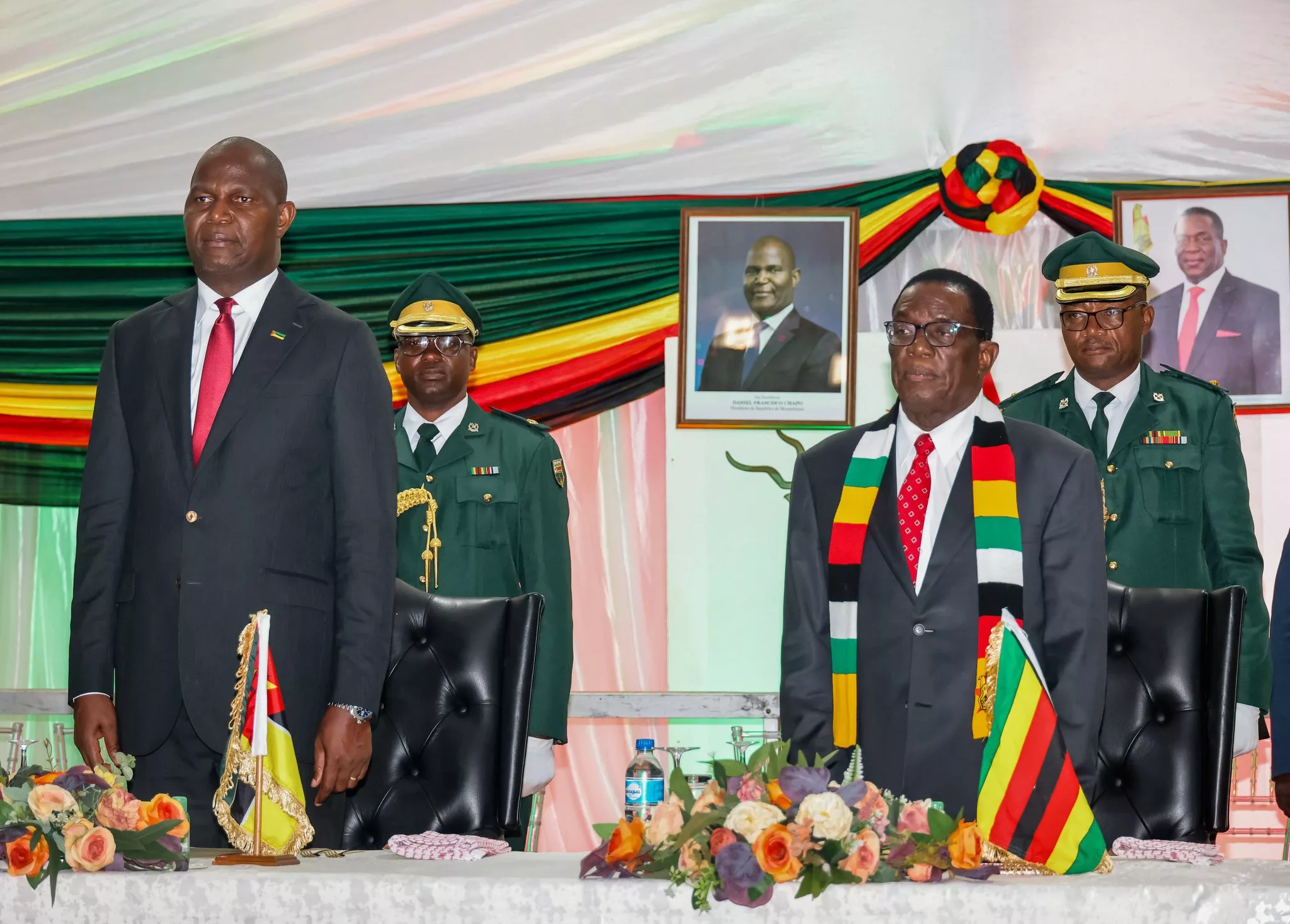|
Getting your Trinity Audio player ready...
|
Mozambican President, Daniel Chapo, has underscored the importance of boosting and facilitating trade between Mozambique and Zimbabwe to deepen economic complementarity and the creation of economies of scale using the sister republics’ existing natural resources, infrastructure, and logistical means, especially the Beira Corridor.
He made the remarks while officially opening the 65th Edition of the Zimbabwe International Trade Fair (ZITF) in Bulawayo on 25 April 2025. The event showcases regional cooperation, innovation, and economic opportunities.
Key dignitaries in attendance included His Excellency Emerson Dambudzo Mnangagwa, the President of the Republic of Zimbabwe; Honorable Mangaliso Ndlovu, the Minister of Industry and Commerce of the Republic of Zimbabwe; Honorable Members of the Government of the Republic of Mozambique; and Entrepreneurs in various economic spheres.
“Our presence at this important fair represents our determination to boost and facilitate trade between Mozambique and Zimbabwe in particular and with the world in general, as well as attract foreign direct investment from Zimbabwe and the countries represented here for the agriculture, industry, transport, and logistics sectors, among others, thereby stimulating our commercial relations through economic complementarity and the creation of economies of scale using our existing natural resources, infrastructure, and logistical means, especially the Beira Corridor,” President Chapo said.
He said the 65th Edition of the Zimbabwe International Trade Fair was held in a particularly important year, not only because it took place a few days after the celebration of the 45th anniversary of Zimbabwe’s National Independence, but also because Mozambique will host the 60th Edition of the Maputo International Fair (FACIM 2025), which will take place from August 25 to 31 of this year in Maputo, Mozambique, coinciding with the year Mozambique celebrates the 50th anniversary of its National Independence.
Zimbabwe possesses enormous reserves of natural resources, particularly arable land, forests, and world-renowned wildlife reserves such as Victoria Falls, and strategic mineral resources like gold, lithium, and copper, among others, which contribute to positioning its economy as an economic powerhouse and a source of foreign direct investment in the region, without neglecting its role as the region’s and continent’s granary in the past.
Mozambique, similar to Zimbabwe, has immense reserves of soil and subsoil resources, particularly 35 million hectares of arable land, availability of water, natural gas, various types of minerals, a long coastline, and logistical infrastructure that facilitates access to the sea for hinterland countries in the SADC region.
“Our country, being a member state and part of the African Continental Free Trade Area, SADC, benefits from various preferential regimes in the United States of America (AGOA), Europe, and Asia, particularly China, Japan, India, among others, and allows access to a vast market in the region, continent, and world,” President Chapo said.
Despite the geographical proximity, the immense natural and strategic resources to be explored, and the historical political ties of friendship between the two countries, commercial relations, and investments are still incipient and consist of low-value-added products, mostly commodities, without significant variation in their structure or composition over the years.
According to the Mozambique-Zimbabwe Trade Balance, from 2020 to 2024, Mozambique’s exports to Zimbabwe totaled USD 804 million, while imports totaled USD 134.9 million, despite a 4% decrease in exports and a 66% increase in imports during the period under review.
In terms of exports, Zimbabwe’s strategic position on Mozambique’s list of trading partners in 2024 was 15th, corresponding to 1% of exports. The main products exported to Zimbabwe were: electrical energy, mineral or chemical fertilizers, nitrogenous; mineral or chemical fertilizers of mixtures, cooked or stuffed pasta, other tubes and hollow profiles, aluminum wires, mineral or chemical fertilizers, potassium, petroleum oils or bituminous minerals, rice, palm oil and its fractions.
In terms of imports, Zimbabwe’s strategic position on Mozambique’s list of trading partners was 37th, corresponding to 0.3% of imports. The main products imported from Zimbabwe were: unmanufactured tobacco and its waste, flours, powder and pellets of inedible animals, corrugated paper and cardboard, tiles and slabs for paving, insulated conductors for electrical use, seeds, fruits and spores for sowing, cereal-based products, live poultry, raw wood, various food preparations.
In terms of Foreign Direct Investment from Zimbabwe to Mozambique, Zimbabwe has been a traditional foreign investor in Mozambique over the past three decades, having reduced its participation in recent years due to well-known challenges that affect not only Zimbabwe but most countries in the SADC region and the African continent in general.
From 2015 to 2024, 37 projects were approved, likely to create 1,649 jobs, involving private investors from Zimbabwe, with a total value of approximately USD 120 million, of which about USD 35 million constitutes direct investment.
Investment from Zimbabwe was directed 31.70% towards the Aquaculture and Fisheries sector, followed by the Tourism and Hospitality sector with 23.49% of the approved investment, and in third place, the Industry sector with 21.10%.
Consequently, in terms of private investment between the two countries, President Chapo noted with satisfaction the presence of foreign direct investment from Zimbabwean companies in Mozambique, which, although modest, expresses the willingness of entrepreneurs from our countries to explore intra-African investment opportunities.






